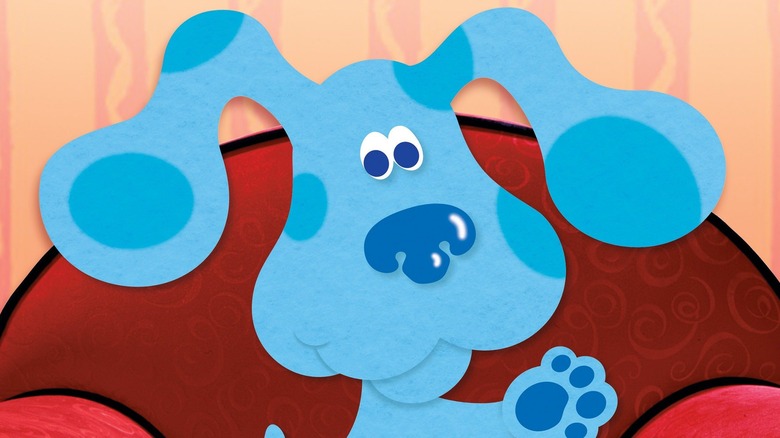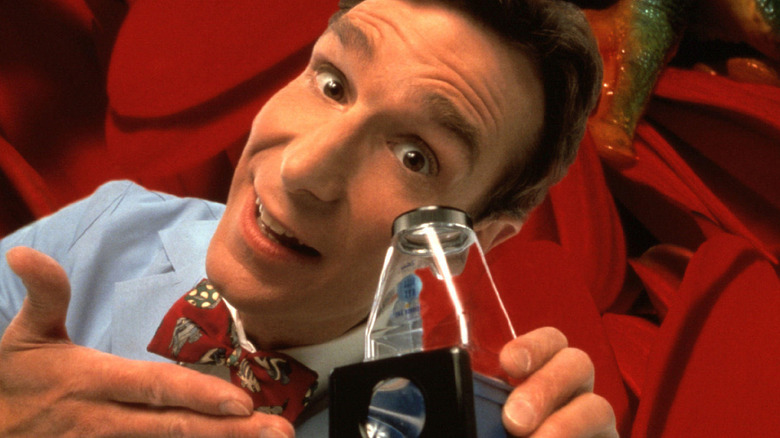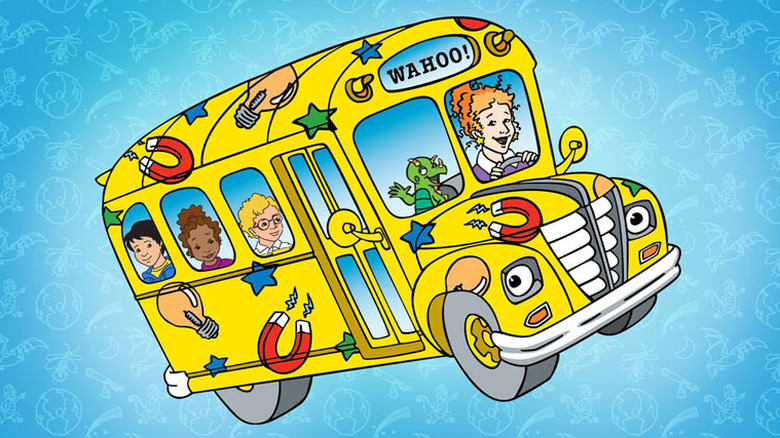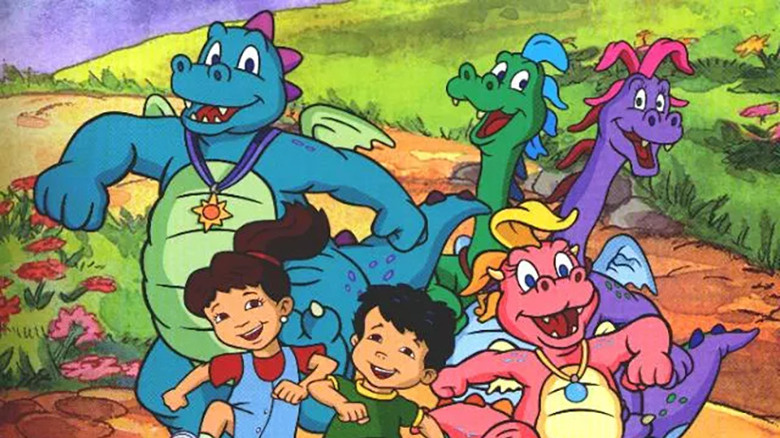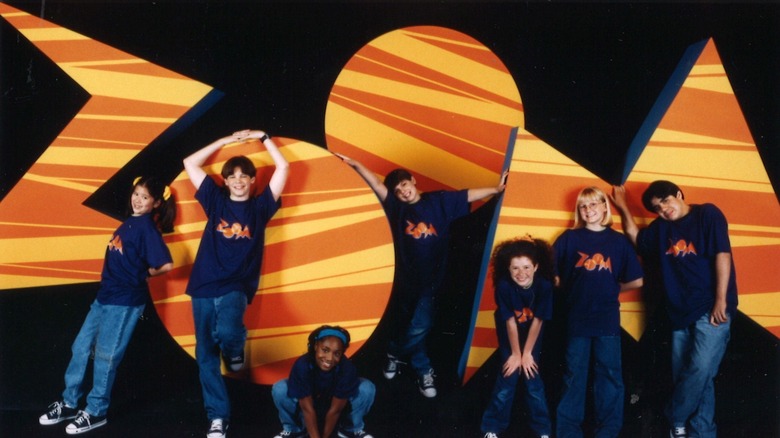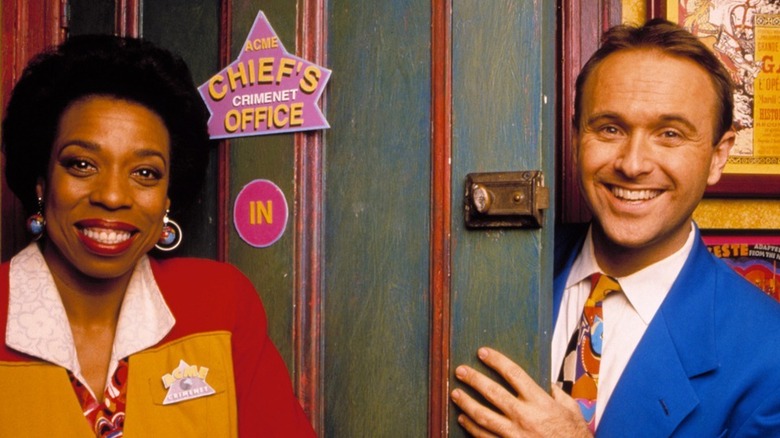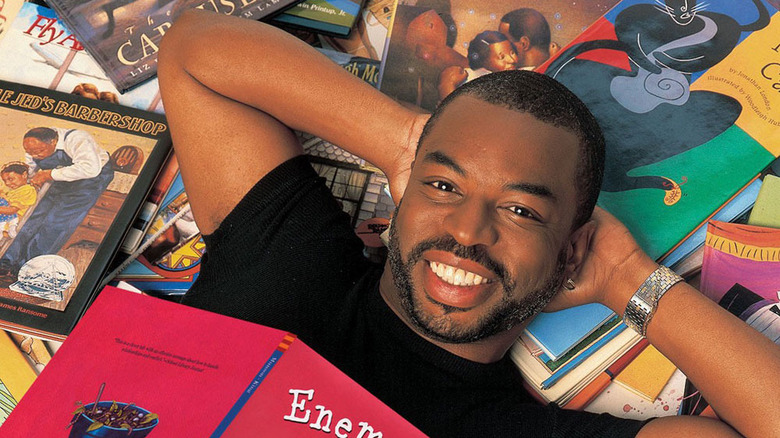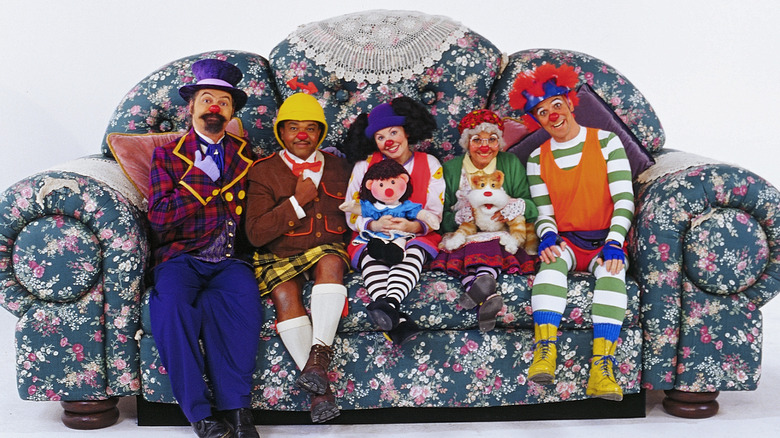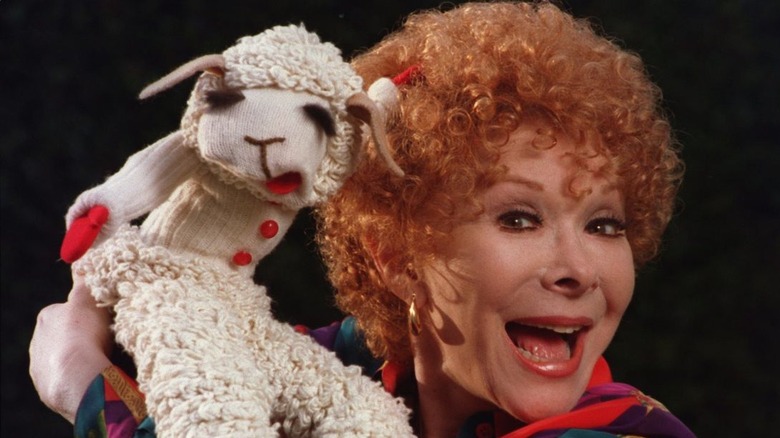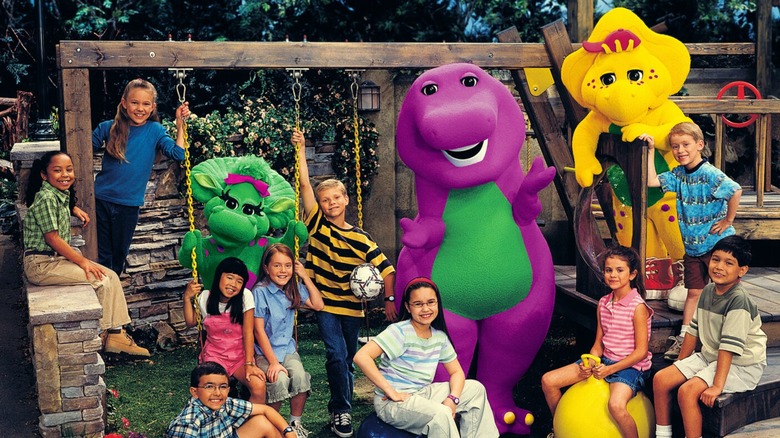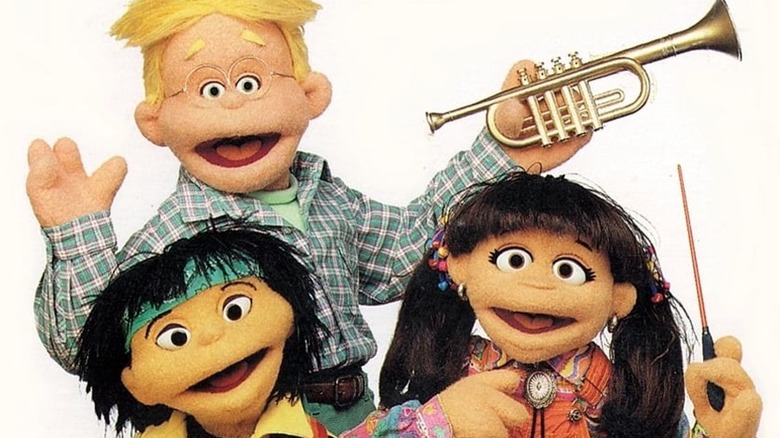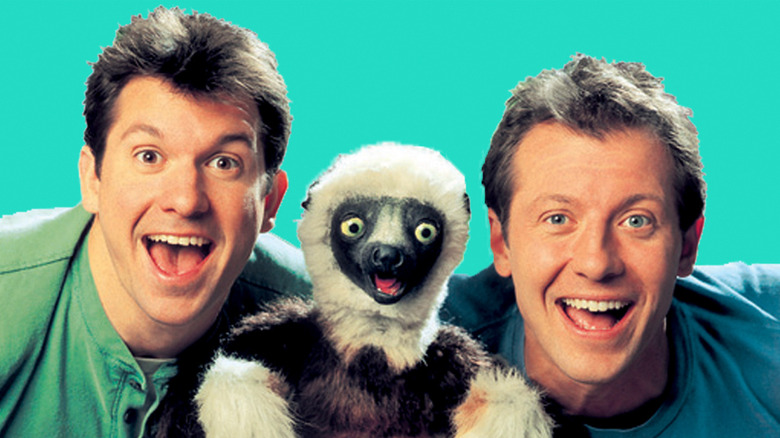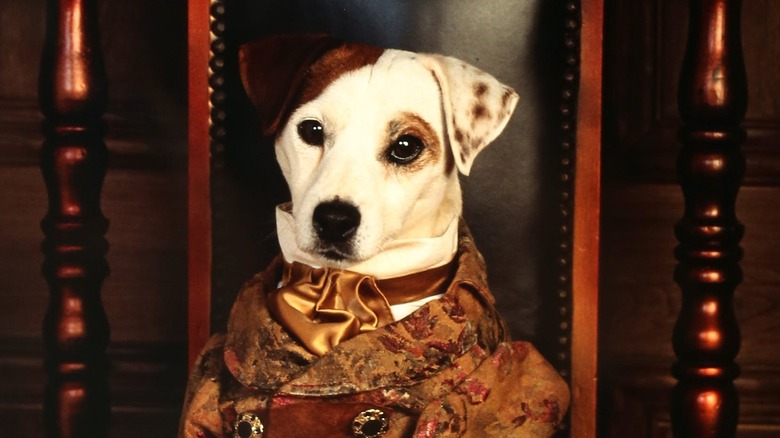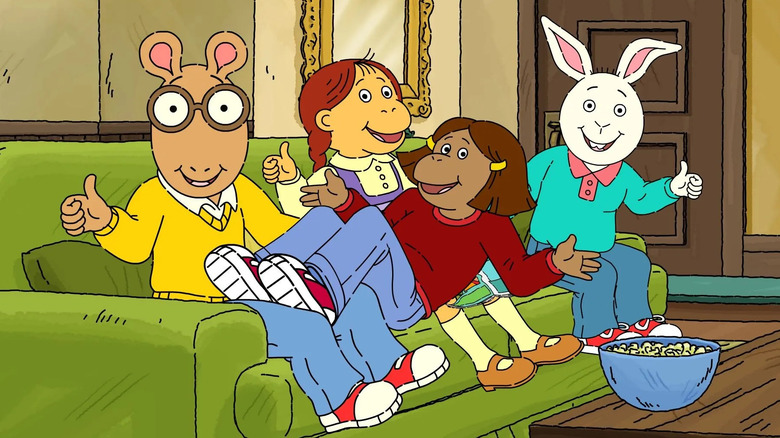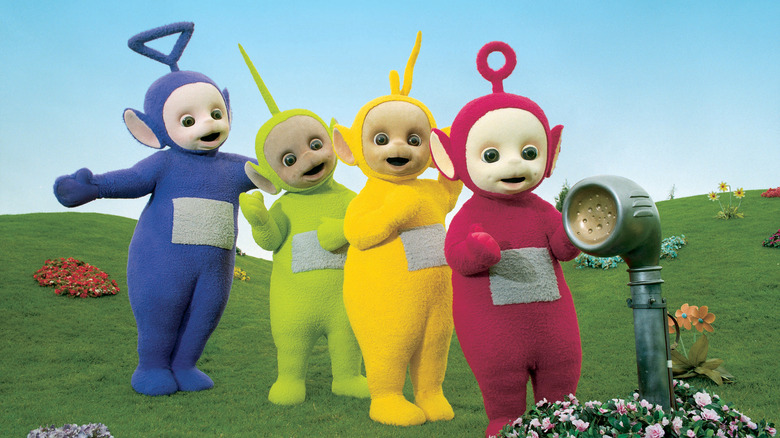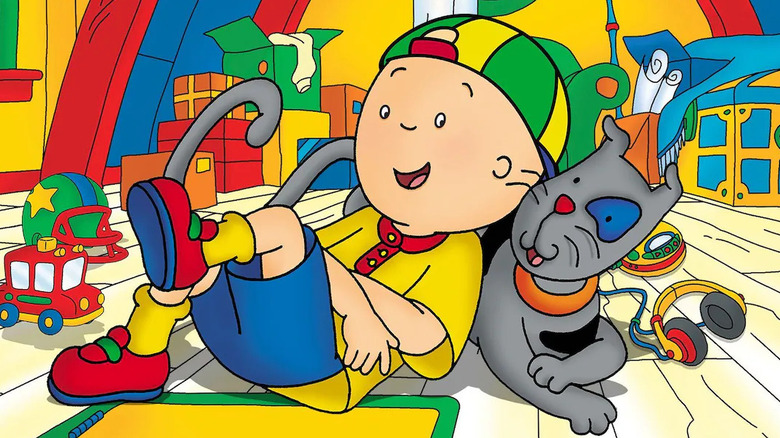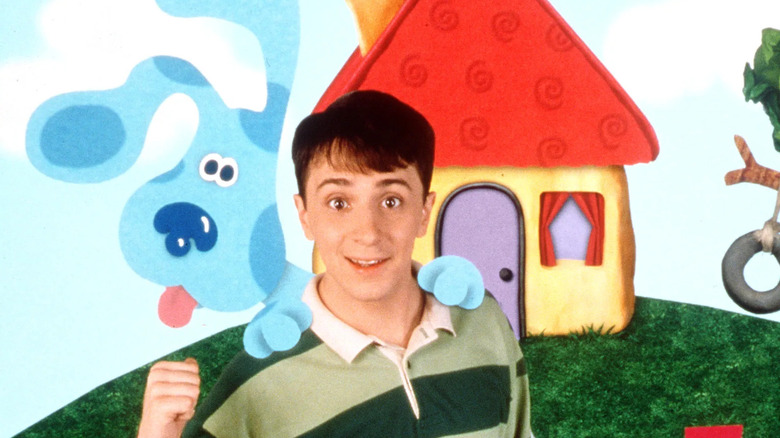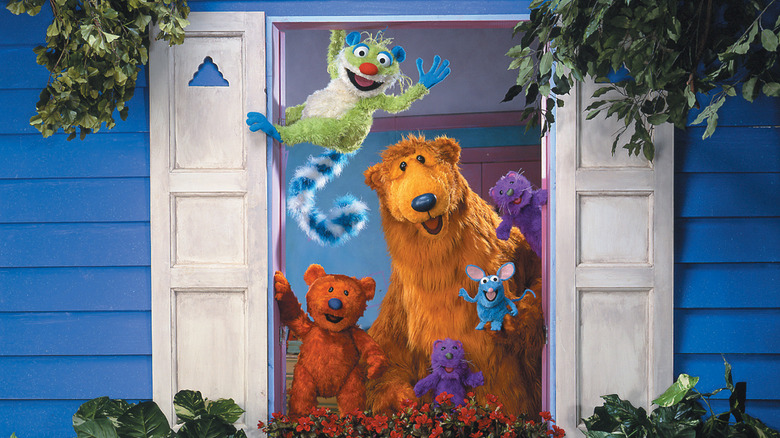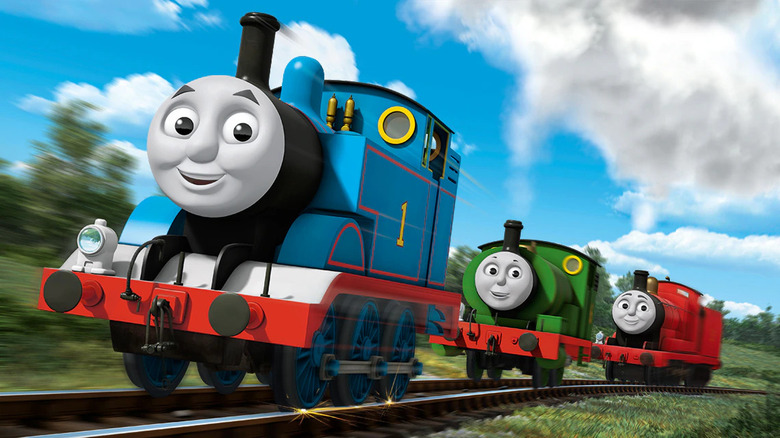Whatever Happened To These '90s Educational TV Shows?
Children's television is an ever-changing landscape. Younger audiences are always craving new and exciting shows, so no network's programming block stays the same for too long. This was especially true in the 1990s, when the Children's Television Act pressured networks to air more educational programming during their normal children's blocks. This led to consistent turnover; for every show that remained on-air, there were half a dozen forgotten shows that were introduced and then either unceremoniously replaced. Due to the level of competition, you never knew if the current season of one of your favorite shows would be its last.
This was never obvious to us as kids, of course. For us, these shows were our formative introductions to the power of media. Some educational programs introduced us to fictionalized narrative storytelling, while others took a documentary approach. Some shows were more about interactivity, encouraging us to play along with exciting on-screen challenges and games. There was no shortage of fun to be had, which leaves many millennials questioning what happened to these foundational pieces of their childhood. Here is just a sampling of answers.
Bill Nye the Science Guy
Consider the following: "Bill Nye the Science Guy" combined science and silliness so well that it effectively became America's science class (some teachers simply played episodes of "Bill Nye" for their students). Nye may not have been an actual scientist, but he nevertheless educated millions of children about all kinds of empirical concepts, from the periodic table to the water cycle. Millennials still bop to the show's iconic theme song to this day.
The series wrapped up at the end of the '90s, and when asked why, Nye explained that the show had run its course at 100 episodes. "It was time to do something else," Nye told the Television Academy Foundation. "We did not [want to] take it too far and have it not be useful anymore." The host also indirectly cited budget cuts to the Corporation for Public Broadcasting, which was a key sponsor for the series. Thankfully, the entire series is available online for free.
Nye continues to be an outspoken educator and pop culture personality. He would host three more educational shows: "The Eyes of Nye," a direct follow-up to the original series; "Bill Nye Saves The World," an adult-oriented revival produced by Netflix; and "The End is Nye," a docu-series exploring apocalyptic threats through a scientific lens.
The Magic School Bus
It was never a normal field trip with Ms. Frizzle and "The Magic School Bus." Based on the hit series of Scholastic children's books, the animated adaptation took an inquisitive elementary school class on a number of incredible adventures in the name of science. From traversing a human immune system to being baked into a pie, each episode was filled with larger-than-life creativity that inspired generations of kids; the series began in 1994, and continued airing reruns until as recently as 2012.
"Magic School Bus" aired on PBS until 1998 when, at 52 episodes, Scholastic ceased production, partly because PBS was no longer able to financially support the series in lieu of newer programming. Scholastic opted to sell broadcast rights to the Fox Kids Network instead, which was in need of more "edutainment" to satisfy regulations brought upon by the Children's Television Act. The series continued bouncing around networks until 2012, after which the entire series was released on DVD as a full box set.
In 2017, Netflix revived the beloved series with "The Magic School Bus Rides Again." Featuring a new flash-based animation style as well as Kate McKinnon's Fiona Frizzle replacing Lily Tomlin's Ms. Frizzle, the series was initially criticized by fans. However, it would win over critics and audiences upon release, inspiring two seasons and four specials. Since 2021, no new seasons or specials have been announced.
Dragon Tales
Though only introduced in the back half of 1999, no '90s baby grew up without "Dragon Tales." Max and Emmy's magical adventures in Dragon Land took a more empathic approach to learning, teaching children how to overcome emotional and social challenges through personal growth and working with others. After all, who wouldn't want to learn life lessons while hanging out with fire-breathing dragons?
Inspired by Ron Rodecker's majestic illustrations of dragons in nature, "Dragon Tales" began airing on PBS as part of its offshoot PBS Kids channel in 1999. However, in 2004, this channel was taken off the air and replaced by the cable-funded PBS Kids Sprout, a channel aimed specifically at preschool audiences. Following this change, no new episodes were produced; by then, the series had amounted to 94 episodes, so it can be safely assumed that production was phased out to support newer programming. However, "Dragon Tales" continued through reruns both on Sprout as well as the PBS Kids block, which was transferred to the flagship PBS channel. Re-runs ceased in 2010 when PBS declined to renew its broadcast rights, however the series remains available on home video and has also been made entirely available online for free, courtesy of series creators Rodecker and Jim Croane.
Zoom (1999)
Children's television is ultimately about children, and "Zoom," originally a '70s variety show, understood this better than anyone. It made the radical move to center children as the hosts, with no adults, allowing young viewers to see their peers on screen and participate with them in arts and crafts projects and fun games. When PBS rebooted "Zoom" in 1999 – the version most of us are familiar with today – it updated the show for a new generation but maintained the same format. Its theme song was poppier, its cast was more diverse, and advancements in technology allowed for email submissions.
The "Zoom" revival was initially successful, but by 2004, the series would cease production. According to "Zoom" executive director Kate Taylor, this was a result of steadily declining viewership in response to an increase in new programming. "The competition is always putting out new shows," Taylor told the Boston Globe. "'Zoom' wasn't getting the real estate that it had in the first years." While a majority of the series has since been uploaded to YouTube, certain portions of Season 1 were never archived and are now considered lost media.
During 2020, in light of the lockdown-driven popularity of the teleconference app Zoom, a short-lived reunion campaign entitled "ZOOM Into Action" was released on YouTube and social media.
Where in the World is Carmen Sandiego?
The '90s were the peak of children's game shows, but none had the educational value of "Where in the World is Carmen Sandiego?" Based on the hit series of computer games developed by Brøderbund, PBS re-envisioned the franchise as a fast-paced quiz show featuring a live studio audience, musical accompaniment from Rockapella, and banter between host Greg Lee and ACME's Chief, portrayed by Lynne Thigpen. The goal of the series was to teach young gumshoes geography, along with accompanying world cultures, all while pursuing the titular criminal mastermind.
After five successful seasons on PBS from 1991 to 1995, the show was replaced by a spinoff series, "Where in Time is Carmen Sandiego?" The change was instigated by the show's producers, who wanted to retain the show's formula but freshen it up to compete with newer PBS programming. Again inspired by a previously-released game from Brøderbund, "Where in Time" saw Sandiego time-hopping instead of globe-trotting. The series reoriented its educational focus to world history, but this new coat of paint wasn't enough to maintain sponsorships: The series would only last for two years.
Two additional "Carmen Sandiego" shows would be produced, both fully animated and episodic; "Where On Earth is Carmen Sandiego?", which aired on FOX, and "Carmen Sandiego," a Netflix-helmed reboot that recently concluded in 2021. Currently, the only place to find episodes of "Where in the World" is through scattered home recordings uploaded to YouTube.
Reading Rainbow
No PBS show more unceremoniously fell off the face of television than "Reading Rainbow." The flagship series debuted in 1983, but remained popular throughout the '90s and beyond. Hosted by television icon LeVar Burton, the series encouraged viewers to engage with the world around them through the power of reading. From active volcanoes to archaeological digs, "Reading Rainbow" took fans to every corner of the world while exposing them to now-iconic books.
Despite its popularity, the series consistently struggled with funding. Things ultimately came to a head in 2002, when the No Child Left Behind Act shifted public broadcasting's focus to more foundational education. "The mandate [was] to teach kids how to read," LeVar Burton told MediaBistro. "There was no money in the budget to encourage, to foster a love of reading." This left the series unable to compete with other programs, ceasing production in 2006 and being officially taken off the air in 2009, after its broadcast rights expired.
Thankfully, the series lives on in multiple forms. Following a massively successful Kickstarter fundraising campaign in 2014, Burton and business partner Mark Wolfe released "Skybrary," a digital library with digital field trips akin to the series' documentary segments. Additionally, Burton hosts his own podcast, "LeVar Burton Reads," in which he reads acclaimed short fiction. Burton designed the podcast to act as a continuation of "Reading Rainbow" for older fans who remain interested in literature.
The Big Comfy Couch
The older you get, the harder it is to find time to clown around. Maybe that's why PBS' "The Big Comfy Couch" has remained a nostalgic favorite since its premiere in 1992. Featuring literally larger-than-life sets and a hodge-podge of quirky characters, led by clown Loonette and her doll, Molly, the series maintained an imaginative but comforting lightness that made it incredibly approachable for young children. The series is still an easy watch to this day.
The series' initial run lasted until 1996, after which Radical Sheep Productions lost funding and fully expected to let "The Big Comfy Couch" live on through reruns. However, in 2002, previous merchandiser Tadpole Kids revived the series in hopes they could maintain its commercial success. The original creative team, both in front and behind the camera, returned to produce two more seasons so the show could reach the coveted 100-episode benchmark for wider syndication. However, the final season saw the departure of Loonette performer Alyson Court, who had given birth to her first child; Ramona Gilmour-Darling took over the role.
Today, the series is available to stream on multiple platforms, including Amazon Prime and YouTube. In 2016, Court would surprise fans and reprise the role of Loonette on the Canadian sketch comedy series "This Hour Has 22 Minutes" as part of a sketch satirizing a rise in serial killers dressed like clowns.
Lamb Chop's Play-Along
In 1960, before Jim Henson would make puppets a staple of children's television, the multi-talented Shari Lewis introduced audiences to her wisecracking sock puppet, Lamb Chop. The beloved comedic duo got their televised start on "The Shari Lewis Show," but that series would be canceled after only three years. Lewis and Lamb Chop were given their flowers three decades later in the more widely revered "Lamb Chop's Play-Along." The series burrowed its way into the hearts of children around the world, earning Lewis six Daytime Emmys and turning "The Song That Doesn't End" into every parent's worst nightmare.
Sadly, unlike that closing theme, "Lamb Chop's Play-Along" would end, but only because Lewis had begun developing a spinoff series, "The Charlie Horse Music Pizza." Starring another "Play-Along" favorite, Charlie Horse, the series was focused on imbuing within children a love of making and playing music. Unfortunately, this series would only last for 23 episodes. While filming the show in 1998, Lewis was diagnosed with incurable uterine cancer. Forty-six days after filming what would be her final segment of the series, Lewis passed away after contracting pneumonia. Shari Lewis' daughter, Mallory Lewis, continues her mother's legacy by performing Lamb Chop around the world and on Cameo to this day.
"Play-Along" was never released on home video; while many episodes have been uploaded to YouTube, some are considered lost media.
Barney & Friends
After conceiving and filming a series of home videos starring a smiley purple dinosaur, Sheryl Leach was approached by a public television executive about giving the character his own show on PBS. By 1992, "Barney & Friends" premiered and quickly became one of the channel's most popular characters, shining his light of positivity towards children's personal growth. He became so incessantly widespread that the character inspired several hate groups, mostly made up of adults who couldn't stand the character's unbridled giddiness.
Despite many speculating otherwise, Barney's cultural divisiveness never directly impacted the series' longevity. In fact, it remains one of PBS' longest-running shows, concluding production in 2010 after its 14th season. It continued to air on PBS until 2016, when the station opted not to renew the series' broadcast rights. Though "Barney" returned for reruns in 2018, this marked an end to the show's cultural ubiquity, which had been in decline after being usurped by other children's programs like "Arthur" and "Blue's Clues."
In 2011, "Barney" creator HIT Entertainment was bought out by toy company Mattel, who announced they would be relaunching the brand. In 2023, Mattel revealed a new, CGI version of the character that would lead an animated reboot in 2024. Additionally, in 2019, it was revealed Mattel had plans for a film adaptation produced by "Get Out" star Daniel Kaluuya.
The Puzzle Place
Representation remains a hot topic, yet so many '90s shows were incredibly diverse, and we all took it for granted. "The Puzzle Place" sported this more than any other show, designed from the ground up to feature an ethnically and culturally diverse ensemble. From one of the minds behind "Reading Rainbow," "The Puzzle Place" followed a group of puppet children who learned lessons about recognizing their differences and fostering an environment of happy coexistence.
"The Puzzle Place" began in 1994 on PBS and quickly became one of the station's most critically revered shows. Three more seasons would be produced, bringing the show's episode total to 75. However, even by its second season, the series struggled to find sponsors for the series amidst poor merchandise sales. By the third, many of its puppeteers had already moved on to other projects. In response, the series ceased production in 1998 and aired through reruns until 2000.
Though the series released a collection of VHS tapes, "The Puzzle Place" has never been released in its entirety on DVD or streaming. While some devoted fans have uploaded their own recordings to YouTube, over half of the series is considered lost media. It is unknown who currently holds distribution rights to the series, leaving "The Puzzle Place" in children's television limbo.
Zoboomafoo
If there's one thing that is guaranteed to mesmerize children around the world, it's cool footage of funny-looking animals. While some shows featured occasional segments of wildlife, "Zoboomafoo" committed to its "'National Geographic' for kids" brand full-stop. Co-starring zoologists Chris and Martin Kratt alongside the eponymous Coquerel's sifaka (portrayed half by real monkey Jovian and half by puppet performer Gord Robertson), "Zoboomafoo" brought viewers up close and personal with the many furry friends who graced the presence of their hangout spot, Animal Junction.
"Zoboomafoo" premiered in 1999 and was an instant success for PBS, however, the series only comprises 65 episodes across two seasons. When a show reaches a certain plethora of episodes, PBS will often simply send these episodes to syndication through reruns as opposed to producing additional episodes. This was the case for "Zoboomafoo," which lasted on PBS sister channel Sprout until 2011.
The Kratt Brothers would continue producing nature shows, including "Be The Creature," a series aimed at teens and adults, and "Wild Kratts," a fully animated serial with more fictionalized elements. Unfortunately, in 2014, Jovian passed away from kidney failure in his home at the Duke Lemur Center. Many fans took to social media to mourn the loss and pay tribute to the television icon. Today, the entire series can be streamed online courtesy of Prime Video and PBS Kids.
Wishbone
How do you teach children about classic literature? Have it be taught by a dog! Enter "Wishbone," created by Rick Duffield and Lyrick Studios and starring the titular Jack Russell Terrier (voiced by Larry Brantley). Wishbone guided viewers through recreations of beloved books, from William Shakespeare to Charles Dickens and beyond. Each episode sported incredible sets, costumes, hair, and makeup to properly immerse viewers in the story.
"Wishbone" premiered in 1995, spawning two seasons and a 1998 television movie, "Wishbone's Dog Days of the West." The series was embraced by educators and awarded for its immense craftsmanship, but only 50 episodes would ever be produced. Unlike Lyrick's other success story, "Barney," "Wishbone" was expensive to produce and had little merchandising potential. Duffield and his team were unable to finance the series and it ultimately ceased production, although reruns lasted until 2013.
"Wishbone" is now owned by Mattel, who intend to adapt "Wishbone" for the big screen. The original creative team has attempted to sell a reboot of the series, but none of their efforts have been successful. "I'd love to do it, but I don't think it's going to happen," head writer Stephanie Simpson told Paste Magazine. "We just weren't able to make any headway with the Mattel people." Currently, fans can watch the entire original series online for free, courtesy of Duffield.
Arthur
Until 2022, it was always a wonderful kind of day on PBS. This was thanks to "Arthur," the long-running animated series based on Marc Brown's popular coming-of-age book series. The show and its lovable cast of anthropomorphized animals graced American households since 1996, making it the country's longest-running animated children's series ever. Not bad for a four-eyed aardvark.
In 2021, PBS surprised "Arthur" fans around the world when they announced the show's 25th season would be its last. The reason behind the decision is unknown, though the amount of episodes per season had been in steady decline since 2016. According to show writer Kathy Waugh, the series had already ceased production in 2020, much to the dismay of its creative team. "I think [PBS] made a mistake," Waugh told the "Finding D.W." podcast (via CNN), "and I know I'm not alone in thinking they made a mistake." As of early 2024, "Arthur" continues to air reruns on PBS Kids, along with new short-form content.
Throughout its run, "Arthur" became the most memed show on children's television. Iconic reaction images include Arthur's clenched fist as well as D.W. with creepy bags under her eyes. "It's been really fun to see these young adults who grew up with Arthur use these symbols and references in their daily life as adults," Brown told Yahoo Entertainment. "I think it's terrific."
Teletubbies
No '90s fever dream was quite as confusing as "Teletubbies." In hindsight, a majority of episodes feel like nothing more than random images and sounds cobbled together. However, the adventures of Tinky Winky, Dipsy, Laa-Laa, and Po managed to be educational enough for multiple years of real estate on the air. The sun baby is still the stuff of nightmares, though.
Imported from the BBC, "Teletubbies" premiered on PBS in 1998, and continued airing until 2008, seven years after the series ended production. According to Laa-Laa actress Nikki Smedley's autobiography, "Over The Hills and Far Away," BBC wanted series creators Anne Wood and Andrew Davenport to continue producing episodes. "They were adamant in their refusal," writes Smedley. "It was time for us all to move on and put our energies into new projects." Wood and Davenport went on to develop the BAFTA-winning series "In the Night Garden...", while a spinoff, "Teletubbies Everywhere," premiered in 2002.
Following its acquisition of "Teletubbies" production company Ragdoll Worldwide, WildBrain (formerly DHX Media) sold the series' broadcast and on-demand rights to Nickelodeon, who brought the entire series to Nick Jr. and the Noggin streaming app. They also produced a revival of the original series that also ran on Nick Jr., consisting of 120 episodes. Netflix would later acquire and redub the revival series and air it on their platform in 2022.
Caillou
Every day was a new adventure with Caillou, the four-year-old suburban child with an unending curiosity and a tendency to start tantrums. Based on the books by French author Hélène Desputeaux, each episode of "Caillou" saw the youngster learning new things about the world around him alongside his mother, father, and younger sister, Rosie. Whether it was how to treat others, how to sail a boat, or how to plant a tree, no day was an ordinary one.
"Caillou" originally aired in Canada during the late '90s before coming stateside to PBS Kids in 2000. The series produced five seasons, after which it aired in syndication until 2021, when PBS opted not to renew the broadcasting rights. Many parents and grown-up viewers celebrated the cancellation following criticisms that the series did not demonstrate enough discipline toward Caillou's difficult behavior. However, the series was soon picked up by Warner Bros. Discovery as part of its Cartoonito children's block, which ran reruns until 2022.
In 2012, "Caillou" creator Cookie Jar Entertainment was acquired by WildBrain (formerly DHX Media). Following the show's run on Cartoonito, WildBrain partnered with NBCUniversal to reboot the series with 3D animation. Five specials premiered across 2022, and a new series is set to premiere at a now undetermined date. In the meantime, fans can watch full episodes of "Caillou" on WildBrain's specialty YouTube channel.
Blue's Clues
By the time networks had to come up with more educational children's programming, PBS was the only game in town. Then came "Blue's Clues," Nickelodeon's first explicitly educational series and one of the first shows to directly involve the audience in a narrative format – the search for hints as to what Blue wants to do. The series was a massive hit for Nick and remains one of the most successful children's programs ever made.
The series Blue Skidoo'd it's way onto Nick Jr. in 1996 and produced six seasons comprising over 140 episodes. During this time, Blue became one of Nick's most recognizable characters, alongside Spongebob Squarepants. However, unbeknownst to most, the series unceremoniously ceased production in 2004 to make way for "Blue's Room," a spinoff that featured a talking, puppet Blue in his playroom. That series produced new episodes until 2007. Both series aired through reruns on Nick Jr. and are currently available to stream on Paramount+.
Today, the series lives on through "Blue's Clues & You," a reboot of the original series with the same formula but updated animation. Most notable is new host Josh Dela Cruz, who replaced previous hosts Steve Burns and Donovan Patton (or "Joe"). Burns, who remains an icon to grown-up viewers, and Patton have made appearances in the new series. The reboot also spawned a streaming film, "Blue's Big City Adventure," which premiered in 2022.
Bear in the Big Blue House
The world loves "Sesame Street" and "The Muppets," but The Jim Henson Company was responsible for plenty of other wonderful television shows, including "Bear in the Big Blue House." Hosted by Noel MacNeal as the eponymous Bear, the series followed a rambunctious group of animals living and learning together in Woodland Valley. Each episode featured musical numbers, including the widely beloved "Goodbye Song" sung by Bear and Luna that closed each episode.
The series began on Disney Channel in 1997 before becoming a staple of Playhouse Disney, the channel's rebranded preschool programming block, two years later. "Bear in the Big Blue House" was consistently among their most popular shows, however production was halted in 2003 following the sudden passing of Lynne Thigpen, the voice of Luna. Production would go on hiatus, during which Disney experimented with "Breakfast with Bear," an hour-long spinoff made up of other shows stitched together with segments of Bear visiting real children's homes. Ultimately, both shows would end in 2006, as Disney had more than enough material for syndication. Reruns continued until 2007.
Disney acquired "Bear in the Big Blue House" in 2004. Following outcry from longtime fans, Disney would add the entire series to Disney+ in 2022. However, several episodes of "Breakfast with Bear" remain lost media. Though MacNeal has expressed interest in returning to the role for a reboot, no plans have been announced.
Thomas & Friends
Sometimes, when life gets tough, it's nice to take a visit to the island of Sodor and visit Thomas the Tank Engine. Inspired by the books written by Reverend Wilbert Awdry and son Christopher Awdry, "Thomas & Friends" follows a group of hard-working freight trains as they haul materials across Sodor's lush railways. They may be good at the work, but there's plenty more to learn on the job, including how to get along with others and how to manage responsibility. With over 580 episodes between 1984 and 2021, the series is one of the longest-running children's shows of all time.
Imported from ITV in the UK, PBS first aired the series as part of "Shining Time Station" in 1989. Beginning in 2004, PBS Kids would air the show on its own and keep it chugging along until 2017, when the broadcasting rights expired. Nick Jr. picked up the slack in 2018, followed by Netflix in 2020. Though the series is now available on that platform, it remains untelevised as a result.
Mattel acquired "Thomas" parent company HIT Entertainment in 2011. Though the original series had continued to evolve throughout its run – transitioning to CG animation and global locations – Mattel eventually chose to quietly end the series in 2021 and relaunch it as "Thomas & Friends: All Engines Go," a 2D-animated reboot currently airing on Cartoon Network and streaming on Netflix.
